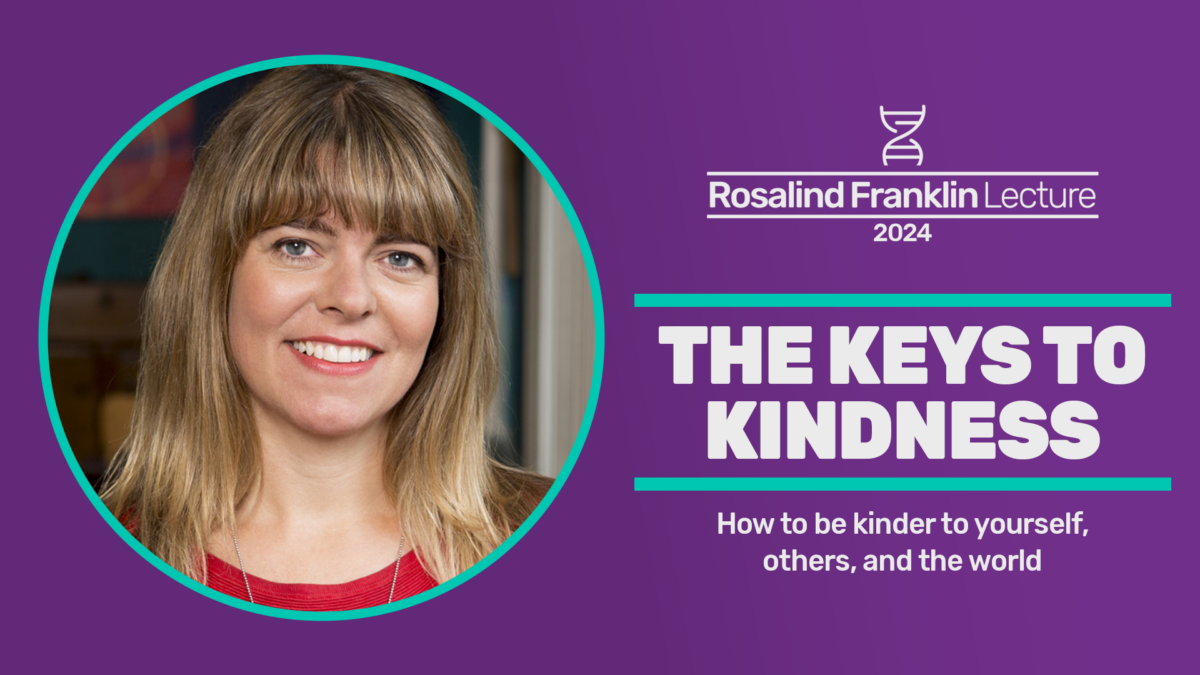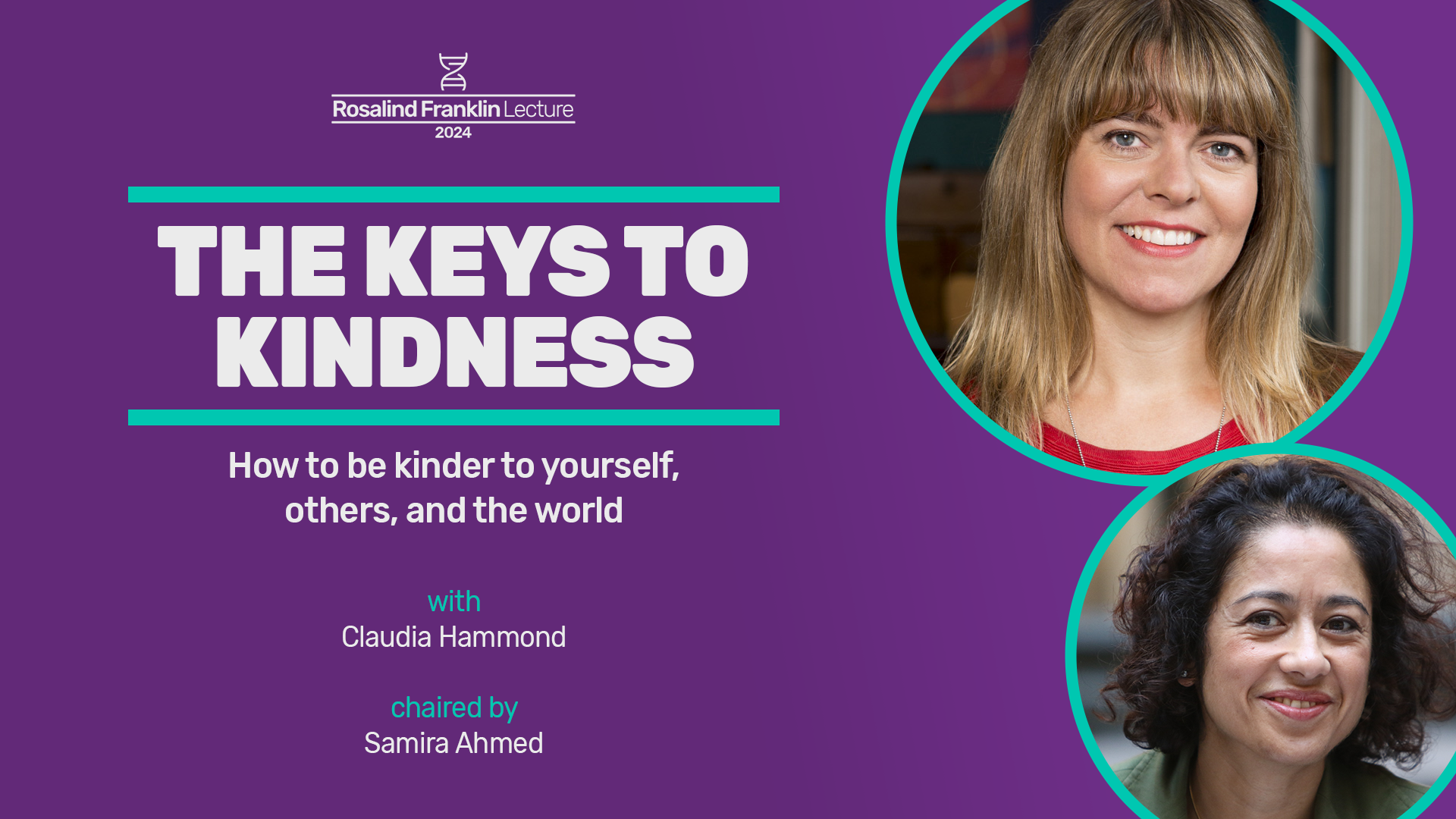
In anticipation of the Rosalind Franklin Lecture on 4 March, we are excited to present this exclusive interview with the distinguished recipient of the 2024 Rosalind Franklin Lecture Medal, Claudia Hammond.
In your Rosalind Franklin Lecture, you’ll be exploring the concept of kindness. Could you share what specifically fascinates you about kindness as a human behaviour?
What fascinates me, and frustrates me too, is that we humans are generally pretty kind to each other, but we don’t recognise that enough. Instead, we focus on the rare instances of unkindness or cruelty. Of course, this is true at the macro-level, where pretty much all the attention in the media is on people behaving badly – wars, crime, corruption, greed. But it also happens at the micro-level. Just think about how one person being briefly nasty to you at work can ruin your whole day, while all the instances of kindness shown to you don’t register anything like as much.
I think the best evidence suggests that human beings are hardwired to be kind, or at least to cooperate. Certainly, we’ve achieved our stunning success as a species through acting collectively and socially. Of course, we’re also guilty of monstrous acts like genocide; we have terrible flaws as well as great attributes. But as Steven Pinker has shown, the arc of human history is bending towards greater humanity. We need to lean into this positive tendency by recognising and celebrating kindness more than we do at present.
Have you encountered cultural differences in how kindness is perceived or practised around the world?
More than 60,000 people from 144 different countries took part in the Kindness Test led by psychologists at the University of Sussex, which I launched on BBC Radio 4. The differences between levels of kindness in different countries were very small. But it did appear that in countries in Africa and in North America, people were more likely to notice the acts of kindness going on around them than they were in the UK and Europe. Overall, two thirds of people told us that they thought the pandemic had made people kinder, but in the US 41% of people who chose to take part in the study told us that they thought the pandemic had made people less kind.
We also saw differences in the things that people felt stopped them from being kinder. In Europe, Africa, and Asia, the most common barrier people cited to being kinder was that they feared their actions would be misinterpreted, but in North America social media was perceived to be a bigger barrier.
Considering the psychological benefits of kindness, what role do you believe kindness should play in education?
I’m sure headteachers these days want their schools to be caring and nurturing institutions, which encourage their students to be kind to each other. Fortunately, during my lifetime there’s been a lot of progress in that direction. When I first went to school there was still corporal punishment, and teachers sometimes used fear to control their classes. Thankfully, we don’t find that acceptable now.
And yet in the UK, we do see troubling levels of mental health problems in teenagers at school – higher than in most comparable countries in Europe. It’s a complex topic, but I do wonder how much the academic pressures to get good grades and to do well on tests are making schools feel like less kind and more pressurised places.
Maybe it’s rather idealistic to hope for this, but I’d like to see less emphasis put on competition in schools, and more on cooperation. After all, looking back, for many of us it’s not the exams that were the most important things about our schools, but the friendship, the camaraderie, and the learning for its own sake. It was being in a choir or an orchestra, or acting in a play, or competing in a sports team that we remember. We need to find more time for those activities again in the way we structure education.
Tell us more about maintaining kindness in high-pressure environments and how kindness impacts mental health.
The important thing to remember in this case is that kindness is a strength, and not a weakness. True kindness doesn’t involve being soft and gullible. It doesn’t mean giving in. There’s now plenty of evidence that you can be kind and be a winner too and so when the pressure is on – whether it be in business, politics, or sport – you can look to role models who’ve dealt successfully with that pressure, without resorting to shouting and screaming, who’ve not been bullies and control freaks, but who’ve dealt with the situation in a calm and cooperative way. One good example recently in a field I know a lot about – I’m joking! – is Gareth Southgate, the England football manager. He’s upended the way managers are expected to behave, showing kindness and compassion towards players, even those who have in some sense underachieved. And, over the longer run, many would argue that he’s achieved more success through this approach than predecessors who took a more hardline, disciplinarian approach.
As for how kindness affects mental health, well, not surprisingly all the evidence suggests that it has a positive impact. And an important element here is that studies show that giving, as well as receiving, kindness has benefits for wellbeing and mental health, as does showing compassion to yourself.
What advice would you give to someone who struggles to be kind to themselves?
I think the key thing here is to invert that well known phrase ‘do as you would be done by’. By that I mean: look at how you treat others and treat yourself the same way. Because often we are harder on ourselves than we are on other people. We say things to ourselves that we would never dream of saying to a friend, putting ourselves under enormous pressure while cutting others more slack.
We’re understandably a little wary of contagion and things going viral these days, but the evidence also shows that kindness has this habit of being contagious: kindness begets kindness. But you do need to show yourself sufficient self-care as well.
With the vast amount of data and stories you’ve encountered about kindness, how has your work influenced your personal perspective on kindness?
There are a few ways that spring to mind. First, I make the effort to notice all the kindnesses done to me and that I see around me. For a while I even kept a kindness diary in which I recorded kind acts – including kind acts I’d done myself. Now I can’t stop noticing the lovely things people do for each other. It helps to counteract the more negative thoughts I have about the kind of world we live in when I see the news. It reminds me that we are human and that most people are trying their best, and go out of their way to be kind.
I also have become better at overcoming my inhibitions about acting kindly towards strangers. In the Kindness Test, people told us that the biggest barrier to acting more kindly more often was a fear of being misinterpreted. Many of us don’t help in situations where we easily could because we are embarrassed about how our actions might be perceived. In fact, in almost all cases, an act of kindness is appreciated by others, even when it’s for a stranger. So the next time you see an older person struggling with their shopping, for instance, do ask if they want any help. The chances are they’ll be grateful for the offer, if nothing else.
Finally, I’ve become better at regulating my reactions to the seemingly relentless misery and vileness of the world as portrayed in the news or on social media. I’ve completely eschewed what is known as ‘doom scrolling’. I still listen to, watch, and read the news, but I always try to remember that what’s in the news is the exception, not the rule. Awful things happen, and awful people saying awful things get a lot of attention, but in fact there’s a lot of good happening in the world too – and most people are nice. Sadly, the nice guys and girls don’t tend to get boosted by the algorithms.
Are you a humanist? If so, what resonated with you about the humanist approach to life?
I’ve never been a person of religious faith, so perhaps by default that makes me a humanist? If I understand it, yes; I think there’s no higher power directing life, and there’s no life after death. There’s brute luck and external factors to consider, but human beings have some control over their own destiny – and the morals and codes we live by our own creation.
And as I have a generally optimistic and positive outlook on human nature, I’m reassured that humans have to look out for themselves and take full responsibility for our actions.
Are there any Humanists UK campaigns that are close to your heart?
Yes, there was a campaign on teaching science in schools. In all the work I do my aim is to communicate the evidence, to tell people about the best research from around the world in psychology and health that we can put into practice in our own lives. We are constantly bombarded with claims and it’s never too early to learn how to tell how to weigh up the evidence.
And then there’s one on reproductive rights. I’ve been presenting Health Check on the BBC World Service for 18 years, and in that time I’ve interviewed women who have experienced some appalling situations which needn’t have happened if they had had the sexual and reproductive rights which I’m lucky enough to have in this country.

The keys to kindness | The Rosalind Franklin Lecture 2024, with Claudia Hammond, chaired by Samira Ahmed
4 March 2024, 19:30
This event is now closed.
